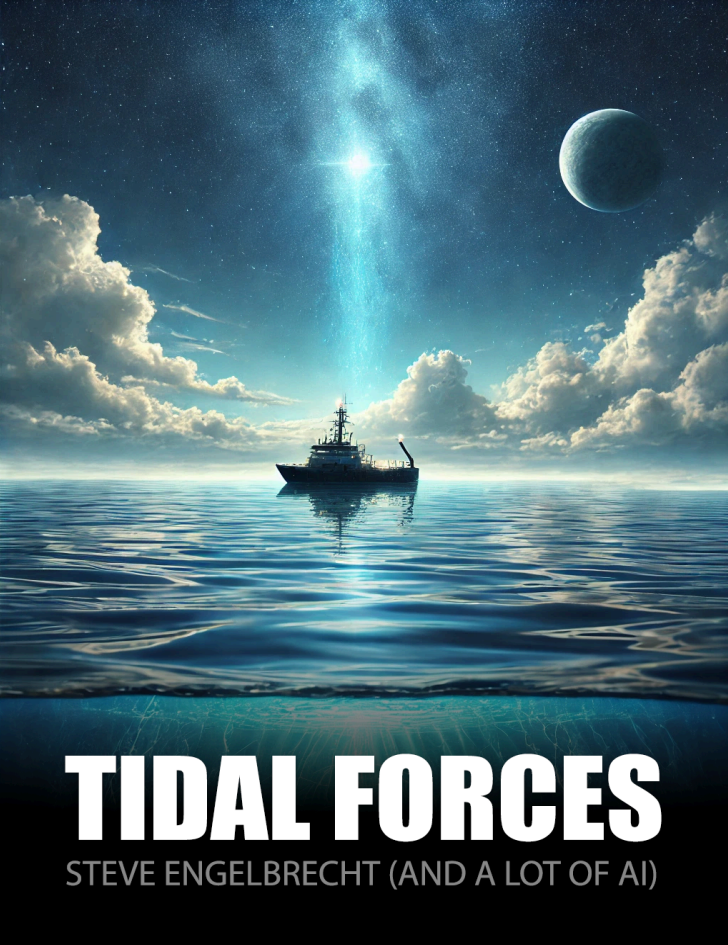OpenAI Agents SDK Practical Use: A Book Written by AI Agents
March 13, 2025

Steve Engelbrecht
CEO & Founder
Steve founded Sitation in 2001 and has enjoyed a long and successful career as an e-commerce technology executive and entrepreneur. He is passionate about building relationships with clients and helping them to solve problems and achieve growth with technology solutions.
Steve earned his bachelor’s degree in computer science from Cornell University and his MBA at the Wharton School at the University of Pennsylvania. Steve was born and raised in New York, and today lives with his family in Cary, North Carolina.
Steve frequently attends and presents at industry events, and is active on LinkedIn. Please follow and connect!

I wrote a book this morning.
Or rather, my agentic AI setup did, while I drank coffee and watched.
It’s a sci-fi novel. About 36,000 words, ~140 pages. It took about 30 minutes and cost me $2 in API credits.
This book is not just a science fiction novella. It’s a technological demonstration.
To be clear, I’m not interested in writing books; this was just an experiment, and one that seems timely and interesting to share as AI becomes more and more part of our personal and professional lives. AI’s promise to “assist” is clear, but this is something else… It ideated, outlined, and wrote an entire novel with minimal input. Long-form, coherent, creative work. No writer’s block, no hesitation—just pure execution.
It was profound, and a little unsettling.
This book is not just a science fiction novella. It’s a technological demonstration of the practical usage of OpenAI’s Agents SDK.
“Tidal Forces” was not written by me. It was written entirely by AI, using an agentic framework to generate the concept, outline, and expand a short story into an 18-chapter novella—with only minimal human input. I didn’t even conceive the storyline — Anthropic’s “Claude” generated the concept, and I deliberately selected its first suggestion as input to my agentic framework.
The entire process—from initial concept to completed manuscript, including my “human in the loop” feedback—took approximately 30 minutes and around $2 in API costs. I simply prompted – in plain text – a sci-fi story with cliff-hangers, plausible technology, personal backstories, and a James Patterson-esque style of short chapters and fast-paced action.
The resulting output is, in my estimation, a fairly well-conceived story about a young scientist who makes a remarkable discovery which can change the world.
As I write this, I’ve only skimmed the first few chapters of “my” book. That’s the point—AI did all the work. I could have just as easily generated a book on basket-weaving, nuclear physics, or the Ming dynasty, in any language. The subject matter isn’t what’s remarkable; it’s the process that matters.
Why This Project is Different
Generative AI, while amazing, has lost its shock value. I don’t think anyone will be surprised to hear that there are a lot of people using ChatGPT and other related technologies to produce long-form content.
What’s unique here is that it wrote a whole book, with just a couple prompts, as I sat at my dining room table.
Long-form, creative output like this is likely to be interpreted as being of human origin, the result of many hours of labor. Yet it took virtually no effort or creative input at all.
That is the difference with agentic AI – it can spawn, iterate, self-test. It will keep going until it reaches a goal. It’s not just helping; it’s now capable of true auto-pilot.
The shock factor is still alive and well in agentic AI. This isn’t just a tool assisting a human—this is AI generating, testing, and refining creative content entirely on its own. The implications are staggering.
I want to share this with the world as a tangible, accessible example of what’s possible with today’s AI technology. This isn’t a theoretical capability or a carefully curated demo—it’s a real-world application that anyone with access to these tools could replicate.
I am not an author. I’m an entrepreneur, a technologist, and an AI enthusiast. Yet here I am with my name on a book, one I didn’t know even last night that I would “own” this morning, simply because I asked an AI to write it with the right tools at my fingertips.
I have no intention of selling this content, and no interest in writing fiction; I just wanted to see if it was possible. And it was far easier and faster than I anticipated.
The Technology
The tech here is, ironically, both very simple (on its surface) and unfathomably elegant and complex beneath the hood. Two days ago, OpenAI released their Agents SDK, which can create semi-autonomous, highly-configurable “bots” which have well-defined roles, can be self-managed and self-spawning as needed, and then can delegate and cooperate to complete complex tasks. In the AI world, we call this “orchestration,” and these new tools make it easier than ever.
Incredible things will be made possible by simple frameworks such as these. My book might be a silly example, but I hope it gives you an idea of the profound changes that are on the horizon.
Profound Questions
Creating full works at the click of a button raises a multitude of profound questions:
- What does authorship mean in an age when AI can generate compelling, coherent long-form content without breaking a sweat? When the technical barriers are so low that literally anyone can do it with a few sentences and clicks of their mouse?
- What happens to the economics and meaning of creative work?
- Where is the line between human and AI creativity when the human’s role is primarily curation and direction?
- Does the value of art change when we know its origin?
- Who owns the copyright to this work? Who deserves credit?
- What does this mean for kids, students, creative professionals, editors, publishers, and the established economies for the creation and distribution of content?
- By definition the output is derivative, but is the story unique? I have no idea! That is perhaps the scariest part.
The point is what this technology represents: a fundamental shift in how output (not just creative content) can be produced, and the evolving role of people in the process. This might seem completely normal in a few years. But as I sit here on the morning of March 13, 2025, this feels — I don’t know, different. Uncomfortable. But also very exciting.
We’re on the edge of something huge, much bigger than books and articles, and I hope we don’t screw it up.
An Invitation to Reflect
As you read this novella — if you read it — I invite you to consider not just the story itself, but what it represents. The technological disruption I’m trying to demonstrate through this work extends far beyond literature — it touches every creative and knowledge-based profession, with no end in sight for its potential scope and influence in how we work and live.
This is not meant to be alarmist or celebratory, but rather an invitation to grapple with the reality that is already here.
We live in extraordinary times. AI is already transforming creative work, and the implications extend far beyond literature. I’d love to hear your thoughts—please connect with me on LinkedIn and let’s discuss!
And yes, I actually wrote this part.
Steve Engelbrecht
Founder & CEO, Sitation
March 13, 2025
